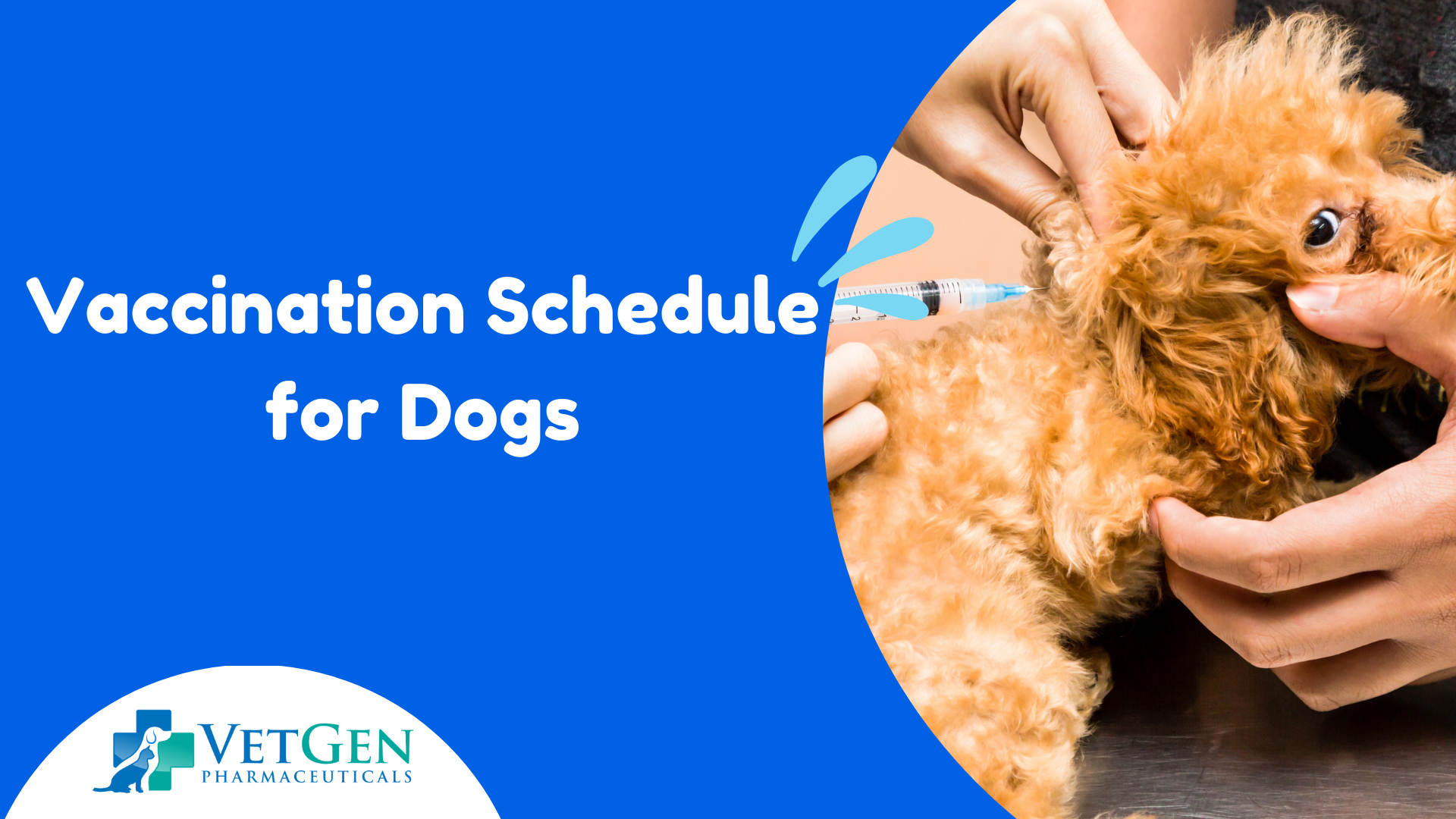Table of Contents
One way of ensuring canine health from puppyhood to adulthood is to vaccinate them. Vaccines are a safe and cost-effective way of protecting your pet from various infectious diseases. Vaccines in veterinary medicines have come a long way, improving the safety of your dog and their efficacy against current and new pathogens.
Sometimes, it can be quite frustrating for a dog owner to keep track of the vaccination schedule for their dogs. With the various types of vaccines required, keeping track of them all can be quite a challenge.
In this blog, we will explore what you need to know about the vaccination schedule for dogs so you can be properly informed.
Why Should You Vaccinate Your Dog?
There are several reasons for vaccinating your canine. Vaccinations are crucial in protecting your dog from many deadly and serious diseases. Additionally, they lower the spread of diseases from dogs to humans and among dogs. One of the best things you can do to ensure your dog is happy and healthy is to vaccinate your dog. It is a crucial part of being a responsible pet owner.
Types of Vaccinations for Dogs
There are two general classifications of dog vaccinations. They are core vaccines and non-core vaccines.
1. Core vaccinations
Core vaccinations are vaccinations that every puppy and dog requires. Examples of core vaccinations include canine distemper, adenovirus 2, parainfluenza vaccine, parvovirus (which are administered as a single vaccine generally called DAPP, DHPP, DA2PP), and rabies virus vaccine.
2. Noncore vaccines
Non-core vaccines are options vaccines administered based on factors like your location and the pet’s lifestyle. These noncore vaccines protect your dog against life-threatening and highly contagious diseases. Usually, doctors consider several factors before determining the noncore vaccines that are right for your dog. These factors can include:
- Your pet’s overall health.
- The geographic location of your dog and the disease risk in the area
- Your pet’s lifestyle includes exposure to water bodies and wilderness, going on hikes, and traveling.
- Whether your dog goes to grooming or boarding facilities, dog parks, or doggy daycare.
Examples of non core vaccines include Crotalux atrox vaccine, canine influenza (H3N2/H3N8) vaccines, Borrelia burgdorferi vaccine, Leptospira vaccine, and kennel cough (Bordetella bronchiseptica) vaccine.
Vaccination Schedule for Dogs
With the knowledge of the various types of vaccinations, it is crucial you know the right time to get them. Usually, the scheduled time for when a dog should get vaccinated is broken down by six to eight weeks, 10 to 12 weeks, and 14 to 16 weeks. Let’s explore them below.
1. Six to eight weeks
Puppies are weaned from their mothers between six to eight weeks old. Veterinarians recommend giving your dog their first shot during this time. The vaccines your dog requires during this period are core DAP/DHP, such as parvovirus, hepatitis/adenovirus, canine distemper, and non-core vaccines, such as parainfluenza and bordetella.
2. 10 to 12 weeks
Usually, it takes between two to four weeks for your dog to take its first shot. You will need to give them a core vaccine booster. They can also be given several non-core vaccines if at risk and per your vet’s recommendations. Core vaccinations include DAP/DHP, such as parvovirus, hepatitis/adenovirus, and canine distemper, and non-core vaccines, such as Lyme, Leptospirosis, and canine influenza.
3. 14 to 16 weeks
After two to four weeks, your puppy will get the final round of vaccinations before reaching adulthood. The vaccinations will include their first rabies shot and DAP/DHP booster. Veterinarians usually leave the last DAP vaccine by 16 weeks or later. Sometimes, states can require vaccinations earlier than this time, so ensure you check your state laws and stick to its schedule. The vaccinations required for this time period include core vaccines like rabies, DAP/DHP such as parvovirus, hepatitis/adenovirus, and canine distemper and non-core vaccines such as Lyme, Leptospirosis, and canine influenza.
Vaccination schedule for adult dogs
Adult canines require core vaccines such as rabies and DAP vaccines and non-core vaccinations that your vet considers good for your dog. After getting the core vaccines, there are periodic boosters of DHPP and other vaccines. They will be administered:
- DHPP: Every three years after taking the first year dose.
- Bordetella: Every year after taking the first year dose as recommended by your vet
- Leptospirosis: Every year after taking the first year dose
- Rabies: Every three years after taking the first year dose
Note that your vet determines the duration of a vaccine for your dog. If this is your dog’s first time taking a vaccine or is overdue, vets might suggest booster vaccines or an annual schedule for full protection.
Risks Of Administering Dog Vaccinations
There are more benefits than risks for dog vaccinations. It is quite rare for a dog to have reactions to dog vaccines. Like other immunization protocols or medications, dog and puppy vaccination can result in side effects. Therefore, it is crucial to give them vaccines at a time when you can monitor them. Some of the reactions dogs generally experience after vaccinations include sluggishness, fever, vomiting, hives, paw or facial swelling, appetite loss, swelling or pain around the site of injection, diarrhea, difficulty breathing, or anaphylactic shock. For example, in humans, mild reactions can be ignored since they are short-lived. If the reaction is severe, such as lethargy, vomiting, and facial swelling, consult with your vet right away.
Conclusion
Puppy and dog vaccinations should be done during the first visit to your vet. This is usually within the week of getting your new puppy. After getting your puppy vaccinated, you can then schedule for adult puppy vaccinations, which include booster immunizations. Like other immunizations, always adhere to your dog’s vaccination schedule without deviations to ensure your canine health. If you are looking to learn more about vaccination schedules for dogs, this website has answers to the questions you seek.
Frequently Asked Questions
1. What is the number of vaccinations dogs need?
Dogs require core vaccinations administered in three series, which are 6, 12, and 16 weeks old. The core vaccines include parainfluenza, parvo, leptospirosis, hepatitis, and distemper.
2. Do dogs have a vaccine that is the most important?
Core vaccines are considered essential to every dog based on the disease’s severity, transmissibility to humans, and exposure risk. In dogs, core vaccines include rabies, canine hepatitis, distemper, and canine parvovirus. Vets will administer non core vaccines based on the dog’s risk of exposure.
3. What is the frequency of dog vaccination?
Adult dogs are typically given vaccines once per year. However, not all types of vaccines are given once per year. After administering the first distemper series and rabies, the boosters are administered every three years. However, annual vaccinations are given for canine influenza, bordetella, leptospirosis, and Lyme. e’s severity, transmissibility to humans, and exposure risk. In dogs, core vaccines include rabies, canine hepatitis, distemper, and canine parvovirus. Vets will administer non core vaccines based on the dog’s risk of exposure.








